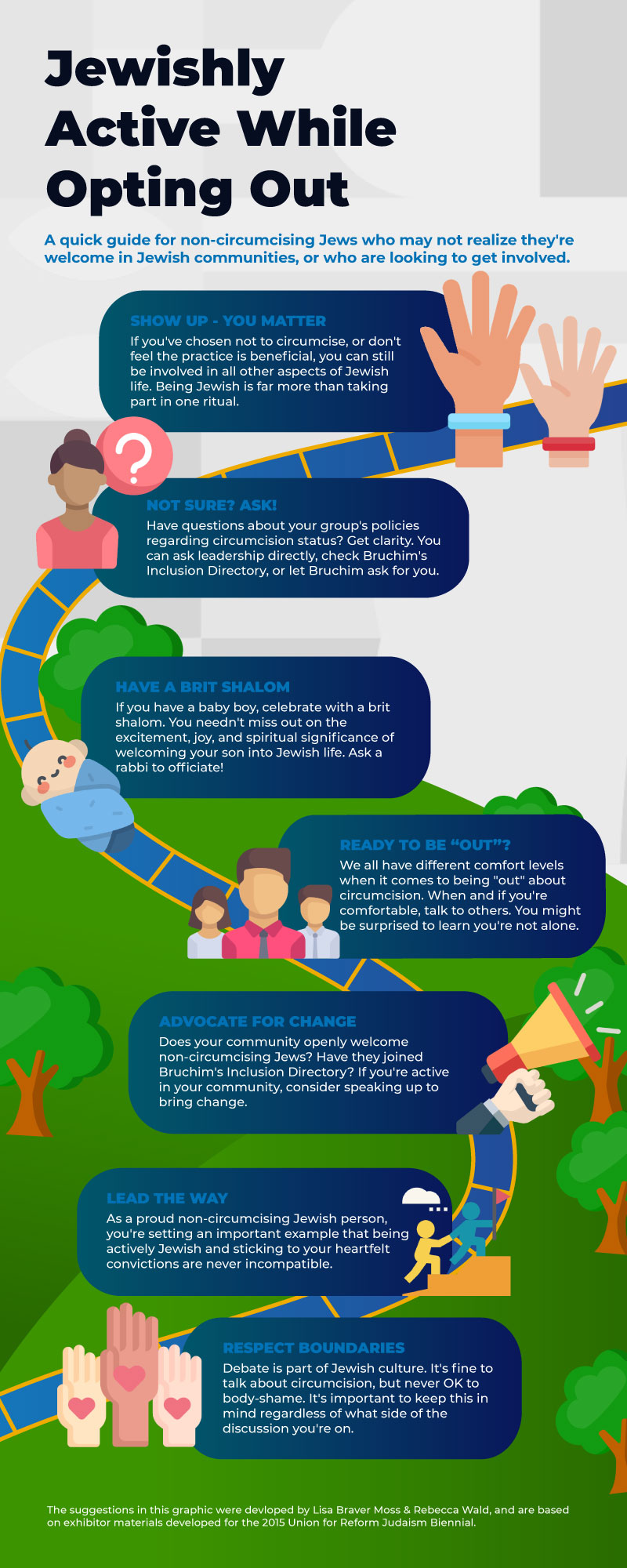March 21, 2022 — In this exploration of Torah text and Maimonides’ book Guide for the Perplexed, Bruchim’s president and co-founder Lisa Braver Moss discusses the practice of brit milah and the Torah’s many mentions of the commandment to love the stranger. What possible connection could there be between the stranger, the newborn baby, and ritual circumcision? Watch here!
I’m the Jewish mother of two grown sons, and I regret having had them circumcised. At the time of my boys’ births in the late 1980s, I was queasy about circumcision. But like many Jewish parents, I felt the pressure of centuries of Jewish tradition, and I believed that circumcising was healthier and more sanitary than leaving a boy with his foreskin. Also, saying “no” to this ancient practice didn’t seem like an option. I wanted to avoid conflict with my husband (also Jewish), who was very pro-circumcision at the time, and I was afraid that if we opted out we’d be ostracized by our community.
It’s not a natural thing to hand over a tiny newborn for circumcision. How is it that most of us in the Jewish world are able to do it? Here’s one possible reason: we don’t know the baby yet. Perhaps the first person to articulate this idea was 12th Century rabbi and physician Moses ben Maimon, better known as Maimonides. In Guide for the Perplexed, Maimonides explains the benefit of circumcising at eight days, rather than later, as follows:
“The parents of a child that is just born take lightly matters concerning it, for up to that time the imaginative form that compels the parents to love it is not yet consolidated. For this imaginative form increases through habitual contact and grows with the growth of the child… the love of the father and of the mother for the child when it has just been born is not like their love for it when it is one year old, and their love for it when it is one year old is not like their love when it is six years old.”
Maimonides is telling us that we naturally have a less-developed love for our newborn than we will have for the child later. We must circumcise our sons as infants, he says, lest we neglect to do so as we get to know them better and love them more deeply. In effect, Maimonides tells us to do to this “stranger” what we would not do to an older child.
But wait, aren’t we supposed to love the stranger? Indeed, the commandment to love, and have compassion for, the stranger, is one of the most significant of all Jewish principles, occurring at least 36 times in the Torah. In Exodus, and in most of the other verses that talk about welcoming the stranger, the commandment is expressed as what not to do: “Do not harm, do not oppress.” The reason for the Torah’s admonitions regarding the stranger is that since we were once strangers in the land of Egypt, we should understand how it feels to be at a disadvantage.
But what about all the stories of parents instantly bonding with their newborns? While there are certainly accounts of immediate, deep love, we should be careful not to romanticize those early moments and days. What Maimonides intuited centuries ago is backed up by modern scientific research. For one thing, it’s estimated that up to 80% of new mothers experience some level of depression after the postnatal drop in endorphins. Some studies have demonstrated an association between such depression and delayed or inadequate bonding.
New fathers, too, may be slow to bond. According to researchers at the University of Cambridge and Vrije University in Amsterdam, the proportion of parents who report not falling in love with their infant immediately is between 25 and 35%. Moreover, social stigma around slow bonding can make parents secretive about their true feelings. Thus, the percentage of parents who take weeks or months to solidify their bond could well be much higher than 35%. If one factors in any trepidation about the prospective circumcision, the newborn period can be a very anxious time. It seems likely that anxiety, too, could make it more difficult to bond.
Now back to Maimonides. While he’s right about our bond with our infants solidifying over time, I don’t agree with his solution of circumcising when our bond is still tenuous. Instead, I think we should correct for the psychology that makes us feel some detachment from the infant. We should treat the “stranger” with the same care and kindness we would show to a more familiar member of our tribe.
11th Century French rabbi and scholar Rashi suggests that it’s not enough simply not to oppress or wrong the stranger. One must act affirmatively to try to love them and have compassion for them. In exploring the mitzvah of loving the stranger, Rashi quotes from the Talmud as follows: “Do not taunt your fellow with the blemish you yourself have.”
In other words, just because something has been done to you does not mean you should do it to someone else.









